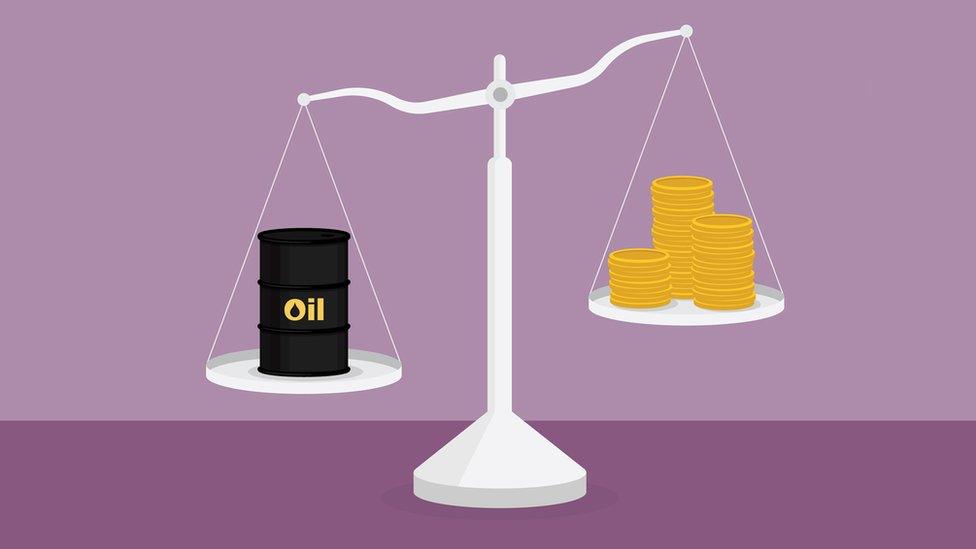UK gas crisis: How will it affect food and energy supply?
- Published
- comments

You may have heard about a gas or energy crisis in the UK right now.
At the moment there is not enough gas in the UK. This is called a shortage - when there isn't enough of something we need.
The gas shortage has affected lots of things - in particular the cost of energy and our food supply.
This is a complicated topic and even adults find it confusing - but it's an important one to understand - so read on to find out more about why a shortage of gas matters.
What do we mean when we say gas?
When we talk about gas in this context we are speaking about a type of energy.
This gas is a type of fossil fuel. This means it can provide energy which powers homes, businesses and public services.
Fossil fuels are made from plants and animals that died thousands of years ago. They are found in the Earth's crust.
Coal, oil and natural gas are all types of fossil fuels.
Fossil fuel is a major source of energy for that the whole world relies on.
But they are also a massive contributor to pollution and global warming.
Why are gas prices rising?
If you can't see this guide, click here.
Why are gas prices rising a problem?
This graph shows how the cost of gas has risen a lot this year
Britain gets about a third of its energy from burning natural gas.
So this means that paying for energy to power homes, businesses, schools and hospitals will be very expensive.
In the last year energy prices have risen by a huge 450% and they're still rising.
Some companies who supply energy have now gone out of business because they could not afford to pay for gas and electricity to send to customers.
Rising costs may mean that some energy suppliers will need to pull the plug on their businesses
What does this mean for the UK?
There are lots of impacts from a shortage of gas in the UK.
For example, the production of carbon dioxide (also known as CO2) has already gone down a lot because two UK factories that produce it can't afford to pay for their power.
And this matters because carbon dioxide is really useful for the UK's food supply.
This is why you may see less food than usual in your local shop or supermarket.
Carbon dioxide is a really important part of the food industry in the UK
Adding the 'fizz' to fizzy drinks
To help plants like fruit and vegetables grow in greenhouses
To make some foods like meat, bread and bagged salads stay fresh for longer
To keep food cold or frozen whilst it is being transported
What about energy supply?
Rising prices also mean that some energy suppliers are going out of business.
Energy suppliers are companies that buy energy and then sell it on to customers in the UK.
If an energy supplier goes out of business, a customer will be automatically moved to a different energy supplier so they can still get power.
At the beginning of the year there were 70 different companies supplying energy to UK customers.
It's now feared that there will be as few as 10 companies still in business by the end of this year.
Kwasi Kwarteng is Secretary of State for Business, Energy and Industrial Strategy
What is the government doing to solve the crisis?
The government has suggested they may do a number of things to solve the problem.
These suggestions include:
Lending money to the UK's biggest energy suppliers so they can take on more customers when smaller businesses close
Keeping a cap on the cost of energy for customers - this price cap covers 15 million homes across England, Wales and Scotland
Give money to the UK factories that make carbon dioxide so that they can stay open
Looking for other sources of carbon dioxide in other countries
But opposition parties say the government has been too slow to react.
Labour's shadow economic secretary to the Treasury, Pat McFadden, said the crisis "should have been foreseen" - which means that he thinks the Conservative government should have predicted what happened.
And the leader of the Liberal Democrats Ed Davey said that the crisis showed that the UK's energy policy was "lamentable".
The Business, Energy and Industrial Strategy Secretary, Kwasi Kwarteng, responded to criticism saying he does "not expect supply emergencies" and described warnings about shortages as "alarmist".
Keep checking our homepage and news bulletins, as Newsround will keep you updated on this story as it develops.
- Published28 January 2021
- Published21 September 2021
